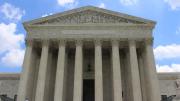Harvard today filed a brief with the U.S. Supreme Court in the case, Students for Fair Admisssions, Inc. v. President and Fellows of Harvard College. The case centers on whether consideration of race and ethnicity should be allowed when admissions committees assemble a class of students; it is an appeal of the plaintiff’s prior losses in federal district court and at the federal appellate level. In a statement issued at the time of the filing, Harvard president Lawrence S. Bacow wrote:
In our brief filed with the Supreme Court today, we have made a powerful case that enrolling a diverse student body is central to fulfilling our educational mission, that diversity enhances education for all, and that Harvard does not discriminate against any group in its admissions practices, a conclusion affirmed by two separate lower court decisions. I encourage everyone to read the brief. It also persuasively argues that the text and history of the 14th Amendment supports the conclusion that the Constitution permits consideration of race as one factor among many in a whole-person admissions process. We remain steadfast in our belief that every college and university must retain the freedom and flexibility to create the diverse educational communities that will prepare their students for the opportunities and challenges they will confront in an increasingly diverse society.
Harvard’s brief states that “Decades of experience and careful study have led Harvard to conclude that diversity ‘lead[s] to greater knowledge’ for everyone, ‘as well as the tolerance and mutual respect that are so essential to the maintenance of our civil society.’ To achieve that objective, Harvard individually evaluates every applicant, assessing not only academic potential and other skills, but all the ways applicants might contribute to one another’s educational experience given their backgrounds, talents, interests, and perspectives.”
Although the Supreme Court has previously held that the Constitution permits the consideration of race as one factor among many in a holistic admissions process, the court’s recent conservative turn may lead it to overrule even longstanding precedents.
Harvard’s brief goes on to argue that the 14th amendment (1868) to the Constitution, one of the post-Civil War Reconstruction amendments, was written deliberately so as not to “require us to disregard the commonsense reality that race is one among many things that shape life experiences in meaningful ways.” To the contrary, “an early proposed text of the 14th amendment would have prevented any differentiation on account of race,” the University’s brief points out. “But the Framers rejected that language, choosing instead to guarantee ‘equal protection’ rather than prohibit all distinctions based on race,” the brief argues, because they understood that “race may be considered to advance overriding governmental objectives” at both the state and federal levels in order to “promote African Americans’ equal participation in society.” Harvard’s brief cites several examples, which involved “measures that benefited not only the recently emancipated, but African Americans more generally.”
With respect to education, Harvard’s attorneys point out that “many of these contemporaneous race-conscious measures focused on education,” adding that nothing in the amendment suggests that “universities must uniquely exclude race from the multitude of factors considered in assembling a class of students best able to learn from each other.” And in fact, essential to Harvard’s mission of exposing students to “new ideas, new ways of understanding, and new ways of knowing,” in and outside the classroom, is the University’s ability to build “classes of students from all over the world who bring different backgrounds and experiences—‘different academic interests, belief systems, political views, geographic origins, family circumstances, and racial identities.’”
In an unrelated move on Friday, the Court separated Harvard’s case, which involves a private educational institution, from a similar case, also brought by SFFA, against the University of North Carolina at Chapel Hill, a public institution. This reversed a previous decision of the Court to combine the two cases; the reversal is believed to have been made to allow justice Ketanji Brown Jackson ’92, J.D. ’96, to participate in the UNC case. As a former Harvard Overseer, Jackson had stated previously that she would recuse herself when the court takes up SFFA’s appeals, likely in October or November.









